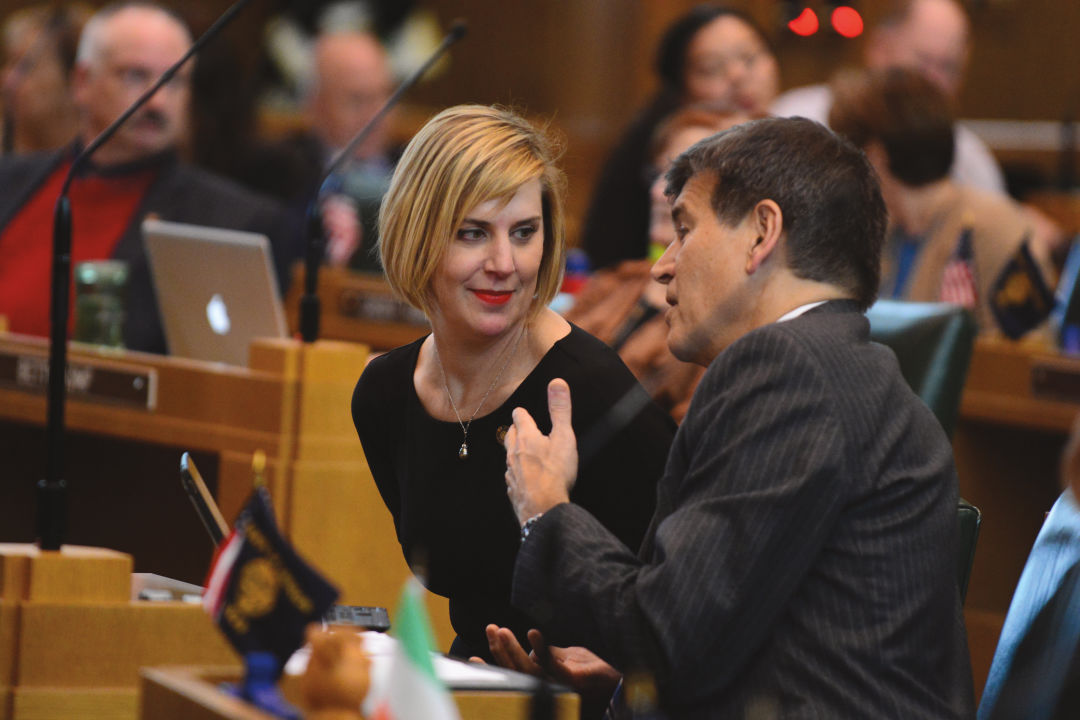House Majority Leader Jennifer Williamson on Oregon's Progressive Agenda

Jennifer Williamson in the House chamber
Image: Courtesy Lynn Howlett
On February 5, the Oregon State Legislature convenes in Salem for a month-long session. On the docket: health care, clean energy jobs, and gun control. (Yeah, there’s a ... contrast with the national scene.) We talked to Jennifer Williamson, the Democratic House majority leader and representative for much of Northwest and Southwest Portland, about what’s at stake.
What’s on the docket this session?
I’m committed to protecting consumers and making sure that people have control of their own data. I’m also focused on commonsense gun violence prevention policies. The governor is introducing a bill that will close some loopholes in our background checks.
How did you get into politics?
I am a fourth-generation Oregonian. My family came in a covered wagon, and my great-great-great-grandfather signed the Oregon Constitution. I got into politics while I was in college at the University of Oregon. There was a move to cut Federal Pell Grants for financial aid, and I was worried I wouldn’t be able to go back to school. I called US Sen. Mark Hatfield and said, “This is what this means for me.” He reversed course on the cut, and I have been engaged ever since.
So anyone can get involved in politics....
The most important thing people can do is talk to their elected officials about how policies in Salem or DC impact them. The best advocates are the people who can talk about their own experience. I think the Republican tax bill is a great example—there will be things in that bill that impact people on a daily basis.
How do you think the tax bill will impact Oregonians?
The people of Oregon will be disproportionately hit by this tax bill. It will impact people in my district and the way that we do state and local taxes. They slipped in health care policy into the bill, so it will impact health care. One of my jobs is to make sure that Oregonians stay insured and that there is quality health care to all.
What changes have you seen so far for Oregonians under the Trump administration?
This administration has really changed the tone and tenor of our public debate. I am a Democrat who went to work for Republican US Sen. Mark Hatfield. I was taught to work across the aisle and in a collaborative way, and that when you get to the legislature to solve problems, you put partisanship aside. I think this administration has changed the tone and tenor, and voters no longer expect or demand bipartisanship out of their legislators.
Women make up one-third of Oregon’s legislature. The national average is 25 percent. How are we so cool?
My caucus is more than 50 percent women. We have had really amazing women come before us. Vera Katz is a great example. Gretchen Kafoury, Barbara Roberts, Betty Roberts. We’ve had a long tradition of very engaged women politically, all the way back to Maurine Neuberger and others who paved the way. I think it sends a very strong message that when women run in Oregon, women win. Once you have women in politics, more women will come.
How do women affect the policymaking process?
Having women in politics, in leadership, and in the legislature creates a different and more collaborative environment. The women I work with are there to solve problems and get things done. From a policy standpoint, things that impact the family rise to the top when women are in leadership. We focus on paid family leave, paid sick days, and health care, especially women’s reproductive health care. We are fighting against this administration to make sure that women have access to birth control, which is insane. We have to have a birth control conversation in 2018? It’s nuts! My guess is that, if we had a woman president, we wouldn’t be fighting over birth control.
In February the Oregon Legislature is convening in Salem. What’s on your agenda?
As representative for District 36, I’m very focused on consumer protection and gun violence prevention. I’m committed to protecting consumers—their personal data—making sure that people have control of their own data. Responding to data breaches, like the one we saw with Equifax, in addition to the rollbacks of protections of consumers at the FCC and at the federal level. I’m also focused on commonsense gun violence prevention policies. The governor is introducing a bill that will close some loopholes in our background check system, including one known as the “Boyfriend Loophole” and the other known as the “Stalker Loophole.” If you’re convicted of stalking, you shouldn’t be able to have a gun. And if you’ve had a restraining order, just because you’re just a boyfriend or a girlfriend, you shouldn’t be able to have a gun, either.
What are other significant issues on the docket?
One of the biggest issues we will see and will be wrestling with is creating more clean-energy jobs. We need to build a 21st-century economy that is based on clean jobs, and we have to focus on climate change and take bold action to reverse the impacts. Health care will be another focus. Ballot Measure 101 will be on the ballot January 23, and it needs to pass. That is the funding mechanism that we use in Oregon to pay for Medicaid and to draw down the federal match to pay for Medicaid. [Editor’s note: it passed.]
State Sen. Jeff Kruse, a Roseburg Republican, was recently accused of sexual harassment. Does that concern you?
For any woman who has had any job anywhere, we can all relate to the claims being made, and that includes me. My job is to ensure that we have an environment where everyone feels safe and welcome in the Capitol, whether you are an elected official, staff person, or you’re an Oregonian constituent coming in for a meeting. I am heartened as a woman that these conversations are happening. We are being proactive in the legislature right now, and we are reviewing all of our policies and will be changing and updating them based on what our review shows. I suspect that we will be strengthening our policies around sexual harassment. We need to do better.




